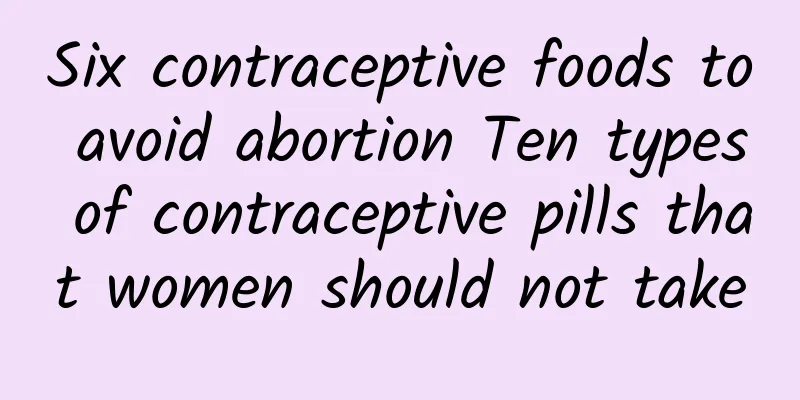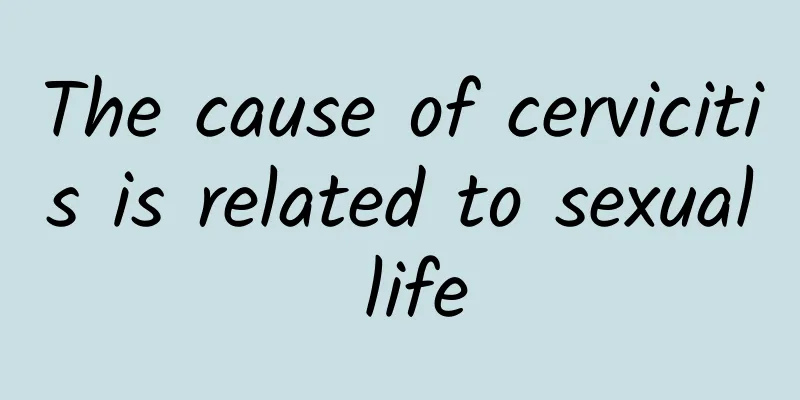Six contraceptive foods to avoid abortion Ten types of contraceptive pills that women should not take

|
Some people do not want to have children so early for various reasons, but they dare not take birth control pills frequently for fear of harming their bodies. At this time, you can choose food contraception, which can effectively prevent pregnancy and you don't have to worry about the side effects of birth control pills. So what foods can help with contraception? Let's take a look with experts. 1. Garlic can kill sperm Eating too much garlic can weaken a person's vital energy and has a significant effect of killing sperm, and has a certain contraceptive effect. 2. Papaya has a good contraceptive effect Papaya is a very effective contraceptive because it contains the enzyme papain, which interacts with progesterone to achieve a contraceptive effect. 3. Coffee affects conception Researchers from the National Institute of Environmental Health Sciences in the United States conducted a study on 104 women who wanted to get pregnant and concluded that coffee has a direct impact on conception. Among these women, those who drank more than one cup of coffee a day were only half as likely to get pregnant as those who did not drink such beverages. Therefore, coffee is the only choice for contraception. 4. Carrots help with contraception Carrots are rich in carotene, multiple vitamins and other nutrients that are beneficial to the human body. Gynecologists at the Rutgers Medical School in New Jersey, USA, found that when women eat too much carrots, the large amount of carotene they ingest can cause amenorrhea and inhibit the normal ovulation function of the ovaries. Carrots can help with contraception. 5. Celery has a miraculous effect in killing sperm It is reported that doctors abroad have found through experiments that eating more celery will inhibit the production of testosterone in men, thus having a spermicidal effect and reducing the number of sperm. After healthy and fertile young men eat celery for several consecutive days, the number of sperm will be significantly reduced, even to the point where it is difficult to conceive. This situation will return to normal after stopping eating celery for a few months. 6. Alcohol can stop ovulation Scientific research has shown that the main component of alcohol is ethanol, which can increase the concentration of catecholamines in the body, cause vascular spasms, testicular dysplasia, and even testicular atrophy. The spermatogenesis function will undergo structural changes, and the secretion of testosterone and other male hormones will be insufficient, resulting in feminine manifestations such as a thinner voice and enlarged breasts. Such people are prone to male infertility, and even if they give birth, the next generation is more likely to be deformed. Women may suffer from irregular menstruation, amenorrhea, egg production mutations, loss of sexual desire or cessation of ovulation, etc. 10 kinds of contraceptive pills that women should not take For many people who do not want children for the time being but still want to have sex, birth control pills are the best choice. However, not every woman can use birth control pills. Some women are not suitable for using birth control pills. Let's see if you are one of those women who are not suitable for using birth control pills. 1. Women with high blood pressure should not use this medicine, as it may increase blood pressure in some women. 2. People with diabetes or a family history of diabetes should not use it, because taking birth control pills may cause a slight increase in blood sugar and turn latent diabetes into overt diabetes, so it will have adverse effects on women with diabetes. 3. Women with acute or chronic hepatitis and nephritis should not take it, because the contraceptives that enter the body are metabolized in the liver and excreted through the kidneys. If women with acute or chronic hepatitis and nephritis use it, it will increase the burden on the liver and kidneys. 4. People with heart disease or poor heart function should not use it. The estrogen in the contraceptive pill can cause water, sodium and other substances to be retained in the body, which will increase the burden on the heart. 5. People who have suffered from vascular embolic diseases (such as cerebral thrombosis, myocardial infarction, vasculitis, etc.) in the past or currently should not use it. The estrogen in contraceptives may increase blood coagulation and aggravate cardiovascular diseases. 6. Women suffering from chronic headaches, especially migraine and vascular headaches, should not use it, otherwise it will aggravate the symptoms. 7. If you have had scanty menstruation in the past, it is best not to use contraceptives. Long-term use of contraceptives can cause the endometrium to atrophy and reduce the amount of menstruation. 8. Women with hyperthyroidism should not use contraceptives until they are cured. 9. Patients with benign breast tumors, uterine fibroids and various malignant tumors should not use it to avoid adverse effects on the tumor. 10. It is not suitable for breastfeeding women to use. Contraceptive pills can reduce milk secretion and lower the quality of milk. They can also enter the breast milk and have adverse effects on breastfeeding babies. Therefore, it is not suitable for breastfeeding women to use. Focus on contraception: 10 misconceptions that keep you ignorant Contraception is one of the hottest topics between the sexes nowadays. Whether it is unmarried men and women or couples who do not want children for the time being, it is necessary to take contraceptive measures during sex. However, many people know very little about contraception and even have some misunderstandings. 1. Women can avoid pregnancy if they jump up and down after sex Experts point out: Even if you jump up and down for "sexy exercise" (who can do this?), or jump 360 degrees after sex, you can still get pregnant. No matter what position you are in, sperm will reach the entrance of the uterus 90 seconds after ejaculation. Can you be faster than it? 2. It is impossible for women to get pregnant during their menstrual period Experts point out: The menstrual period does not mean that the egg will not appear. As long as the sperm meets the egg, it is extremely difficult to break them up. 3. It is impossible for a girl to get pregnant when she first engages in "sexual activity" Experts point out: Any sexual activity can lead to pregnancy, there is no "free trial" rule here. 4. If a woman urinates immediately after sexual intercourse, she will not get pregnant. Experts point out: The human body has many paths. The urethra and vagina are not the same path. 5. It is impossible for a girl who has not yet had her period to get pregnant Experts point out: Women's ovulation period is not based on menarche. Nowadays, nutrition is abundant, and many girls have already started ovulating before menarche. In addition, many girls have their first period at the age of 11. If someone has sex with you before that, go to court and sue him. 6. Swallowing semen can lead to pregnancy Experts point out: People with different beliefs cannot work together. What you eat goes into your stomach and intestines, not your uterus, so if you eat, you can eat as much as you want and you won't get pregnant. 7. Women can only get pregnant if they orgasm Experts point out: There are tens of thousands of pregnant women in this world, but there are countless women who have never experienced orgasm. Pregnancy is fertility, and unless you are diagnosed as infertile, you can get pregnant regardless of whether you have orgasm or not. 8. Incomplete male penetration will not lead to pregnancy Experts point out: Sperm is more tenacious than you can imagine. Even if you are lazy, sperm will still travel a long way to find the egg and take root. 9. Women can reduce the possibility of pregnancy by taking a hot bath before engaging in "sexual exercise" Expert correction: Bathing has nothing to do with contraception unless you have sex alone. 10. After a man ejaculates multiple times, his sperm count will drop to a level that will not lead to pregnancy Experts point out: Sperm production is the most primitive instinct of men. The number of sperm is not allocated on a daily basis. Even if he ejaculates 10 times a day and the 11th time is given to you, you may still get pregnant. |
>>: How to treat cervical erosion cyst? Several best treatments for cervical erosion cyst
Recommend
What are the main causes of cervical erosion?
Cervical erosion is mainly caused by physiologica...
What is inside a woman's uterine fibroids? What is inside a woman's uterine fibroids?
What is inside a woman's uterine fibroids? Wh...
What should women pay attention to in preventing cervical erosion? Five precautions to prevent cervical erosion
Things to note for preventing cervical erosion an...
The most advanced treatment for vulvar leukoplakia
What is the most advanced treatment for vulvar le...
How to completely cure endometrial tuberculosis
Endometrial tuberculosis often does not have a sp...
Are premenopausal changes in menstruation dysfunctional uterine bleeding?
Dysfunctional uterine bleeding refers to bleeding...
Radiotherapy for cervical erosion
If it is found that it is just simple cervical er...
What is uterine fibroids? What are the symptoms of uterine fibroids?
Many female friends find that they have uterine f...
Zeppelin promotes food education: Friendly farming methods make "ugly vegetables" just as nutritious!
Ambitions unfulfilled! It is a pity that Chi Peil...
How does Traditional Chinese Medicine treat congenital absence of vagina?
There are still many women suffering from congeni...
Obesity is the culprit of polycystic ovary disease and can easily lead to infertility! Dr. Pan Junheng: Eat less of these high-cholesterol foods
Women with polycystic ovary syndrome often have p...
What are the symptoms of ovarian cysts?
Ovarian cyst is the most common gynecological dis...
Introduction to several common types of dysmenorrhea
Dysmenorrhea is a disease that seriously harms wo...
Regulate immunity and plan ahead, it’s smart to eat like this in summer! Decoding the commercially available lactic acid bacteria
In the post-epidemic era, in addition to keeping ...
Professional advice on how to prevent menopause
As my country's social economy develops, mate...









